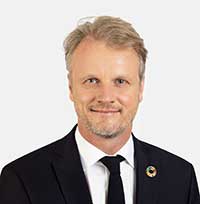[ad_1]

VAUD, Switzerland, Might 16 (IPS) – Michael Keller is Secretary Basic of Worldwide Seed FederationAt lengthy final, momentum is rising for an overdue rethink of climate finance and development assistance to assist international locations on the frontlines of the local weather disaster.

Michael KellerThe newest era of seeds presents varieties tailored to particular climatic circumstances to supply extra dependable meals manufacturing, in addition to improved incomes and livelihoods for farmers, having boosted productiveness by 20 per cent for 9 key crops within the European Union over 15 years.
But improved types of lots of the world’s staple cereals, greens and pulses are too usually inaccessible for farmers in Africa, regardless of having a number of the biggest publicity to local weather extremes.
For example, in East Africa, licensed high quality seed potatoes – which produce greater yields and higher resilience to climatic adjustments, pests, and ailments – account for only one per cent of all these planted by farmers.
By leveraging the advances and assets of the industrial seed sector – supported and scaled by public and NGO companions – the worldwide group can guarantee African farmers obtain the tangible, long-term assist they want to deal with the impacts of local weather change.
To start with, delivering the most effective varieties together with coaching in good agricultural practices for farmers can increase their yields and subsequently incomes, permitting them to thrive regardless of the rising affect of local weather change.
For instance, non-profit Truthful Planet coached greater than 2,300 lead farmers in 65 Ethiopian villages and educated their regional extension brokers in improved farming practices. With this coaching, farmers have been capable of shortly undertake and maximize their crop yields utilizing domestically examined and improved types of greens.
In complete, some 75,000 smallholder farmers within the mission’s areas subsequently tripled their vegetable manufacturing at a time when the Horn of Africa confronted urgent meals safety challenges. Because of an historic, ongoing drought, an estimated 22 million persons are at present dealing with acute meals insecurity throughout Ethiopia, Kenya, and Somalia.
In line with an exterior analysis, greater than 95 per cent of households concerned in Truthful Planet’s work in Ethiopia – or roughly 485,000 individuals – benefitted from improved diet after the elevated yields raised family incomes in only one manufacturing season by greater than 25 per cent. This additional earnings offered farmers with a higher buffer towards local weather shocks, and more cash to spend on well being providers and schooling for his or her households.
Opening up entry to improved types of staple crops performs an essential function in safeguarding meals and diet safety within the face of local weather change, which may scale back ranges of protein, iron and zinc in cereals by as much as 10 per cent.
That is why the Worldwide Seed Federation (ISF), along with Truthful Planet, is embarking on a five-year mission to extend farmer alternative of and entry to high quality seeds in Rwanda.
The goal is to profit 84,000 Rwandan farmers by providing elevated entry to improved, high-quality vegetable, pulses, cereal, and potato varieties alongside downstream worth chain initiatives coaching to assist greater yields and incomes, and local weather adaptation.
The ultimate piece of the puzzle is to determine the insurance policies and laws wanted to develop resilient and sustainable seed programs that profit farmers. This requires policymakers to construct an environment friendly and efficient regulatory framework that gives reassurance to farmers that they’re receiving the very best high quality seed yr after yr, whereas additionally offering the long-term certainty prone to incentivize extra non-public sector funding.
High quality seeds are clearly the bedrock upon which productive and resilient farming programs are constructed, but these applied sciences so far stay out of attain for a lot of of Africa’s farmers – one of many many important challenges they face at the moment.
By investing and collaborating to construct resilient seed programs, the non-public sector can share extra broadly the fruits of progress in international crop science by way of partnerships that guarantee farmers obtain seeds that aren’t solely match for function however match for the longer term.
Improved seeds can then pay dividends by unlocking higher productiveness, incomes, and local weather resilience for these on the frontlines who’ve for too lengthy been underserved.
IPS UN Bureau
Follow @IPSNewsUNBureau
Follow IPS News UN Bureau on Instagram
© Inter Press Service (2023) — All Rights ReservedOriginal source: Inter Press Service
[ad_2]

